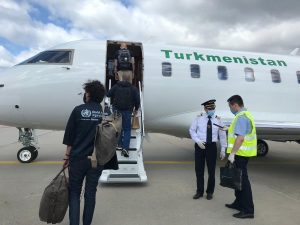Months after tweeting that World Health Organization COVID-19 technical teams would be welcomed in both Tajikistan and Turkmenistan “in the coming days” as part of a Central Asia mission, WHO Europe regional director Hans Kluge tweeted on July 6 that the expert team was finally on its way to Turkmenistan.
Turkmenistan remains one of fewer than a dozen countries in the world to not have reported a case of the novel coronavirus, which causes the disease dubbed COVID-19. Turkmenistan is one of only two countries in all of continental Asia, along with North Korea, to mysteriously not have found a single COVID-19 case.
Regional experts across the board don’t believe a word of the Turkmen government’s denials. On June 23 the U.S. Embassy in Ashgabat issued a health alert noting that “While there are no official reports of positive COVID-19 cases in Turkmenistan, the U.S. Embassy has received reports of local citizens with symptoms consistent with COVID-19 undergoing COVID-19 testing and being placed in quarantine in infectious diseases hospitals for up to fourteen days.”
Ashgabat protested the notice, calling it “fake” news.
On April 23, Kluge announced via Twitter that “MFA Tajikistan and MFA Turkmenistan welcome @WHO_Europe technical Teams on #COVID19 #UHC in the coming days as part of Central Asia Mission on #COVID19. #UnitedActionforBetterHealth.”
At the time, both Tajikistan and Turkmenistan claimed to have not found any cases of the novel coronavirus in their countries. On April 30, Tajikistan announced its first 15 COVID-19 cases; on May 1, the WHO team landed.
On May 5, Kluge tweeted, “I welcome Turkmenistan Government’s invitation for @WHO_Europe to undertake a technical #COVID19 mission” and that the WHO was “ready to deploy experts as soon as possible.”
In the ensuing days, however, the Turkmen leg of the trip never happened.
As Bruce Pannier noted in early May, the Turkmen government’s behavior fit a pattern. The WHO was being taken for the same ride other bodies, which also depend on direct invitations to operate in member countries, have long been taken on by Turkmen authorities:
The method of delaying the WHO delegation’s visit draws on an old Turkmen government trick for OSCE election monitors that dates back more than 20 years to when authoritarian leader Saparmurat Niyazov was president.
Niyazov said all who wish to monitor elections are welcome, but no one would be specifically invited.
The OSCE’s Office for Democratic Institutions and Human Rights (ODIHR) offers to monitor elections, and Turkmenistan is an OSCE member, but ODIHR requires a clear, official invitation to do so, and Turkmen authorities have never sent a specific invitation to ODIHR.
The WHO delegation is in a similar situation. They need an official invitation to visit Turkmenistan and Turkmen authorities have not sent one to them.
Now that the WHO is on its way, we have to wonder what it will find and what it will say; will it matter at all if Turkmenistan continues to deny the existence of COVID-19 inside its borders?
The WHO demonstrably lacks an ability to be critical, in public at least, of countries and their handling of the pandemic. Kluge noted this specifically in a statement to Russian-language media in early June. “Many of you [journalists] are asking me to assess this or that country’s performance during the pandemic,” he said. “Let me be clear: WHO’s role is not to offer any assessment on how particular countries have responded to the challenge.”
But the WHO has, indeed, offered assessments of how particular countries are responding to the COVID-19 challenge. The WHO has refrained from criticizing countries, but not at all from praising them.
On May 12, for example, Kluge tweeted, “Kazakhstan a great example of proactive efforts to stabilize #COVID19,” listing strong surveillance; extensive testing, including of health workers; digitalized data collection; timely prevention and intensified contact tracing; treating patients appropriately and research by the Kazakh health minister.
About a month later, in mid-June, Kazakh Health Minister Yelzhan Birtanov was hospitalized with COVID-19, and soon after First President Nursultan Nazarbayev also tested positive (though he recovered in time for his 80th birthday on July 6).
On July 5, Kazakhstan rolled out its second nationwide lockdown as cases continue to rise at a concerning rate.
What will the WHO find in Turkmenistan? Will Turkmen authorities, like those in Tajikistan, suddenly acknowledge COVID-19 cases in their midst? And if Ashgabat continues in its denial, will the WHO simply keep quiet, because if it cannot say anything nice it would prefer to say nothing at all?
































